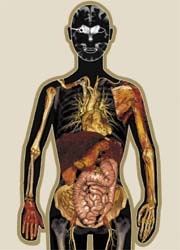Russia: New cardiology centre signals better healthcare
By Olga Ostrovskaya
One of the most painful problems of modern Russia is the high death rate, especially among able-bodied people. In 2005, the average life expectancy for men was 58.8 years.

In 2006, there was a significant decrease in the population death rate. Cautious estimates show that, for the first time for last eight years, the increase of 1.5 years in life expectancy for men exceeded the pensionable age. A reduction in deaths was observed in all the basic causes, including cardiovascular diseases at 67.3 thousand (5%). Could this improvement signal the beginning of a long-term positive tendency?
About a year ago, the leaders of the Russian Federation’s government emphasised that it is expedient to include in the priority national project on public health services measures to decrease the death rate from preventable causes. It is no secret that many Russians die young from chronic diseases that simply are not diagnosed in time and, even when a correct diagnosis is made, the patient does not receive the necessary help, because of the absence of advanced equipment, and doctors’ cannot provide qualified help.
In 2007, in the national ‘Health’ project, top medical technologies were given a new priority.
Over 30 billion roubles of the federal budget were allocated to construct 14 hi-tech medical centres in Russian regions. Eight of these have been chosen – based on population healthcare needs, as well as the presence in these localities of variously qualified personnel.
As a result, cardiovascular surgery has been sited in Penza, Astrakhan, Khabarovsk, Krasnoyarsk and Kaliningrad; traumatology and orthopaedics in Cheboksary and Krasnodar, and neurosurgery in Tyumen.
The emphasis on cardiology is clear: cardiovascular diseases kill about a million Russians annually. ‘We lag behind Europe and the USA in a number of medical technologies, particularly for cardiovascular surgery’, according to Jury Neomycin, deputy head of the Federal agency for high technologies.
The first centre – At the end of January the first cardiology centre opened in Penza – a city not chosen accidentally, for it is well-placed geographically, with highways and railways enabling patients to travel to the centre from different corners of the region.
President Vladimir Putin and the members of the State Security Council attended the opening. After their tour (buildings are under construction with special units using German technology) government members and many of the country’s top physicians held a meeting to focus on problems in the development of high-tech medical equipment.
One problem is financing such devices; another is training doctors to use them. For the new and well-equipped centres to provide appropriate patient care, preparation is necessary, in the short term training over 1,000 doctors and about 1,000 nurses are needed. In essence, this will demand the creation of a new system of retraining for medical personnel.
If all the envisaged premises can be executed, public health service leaders hope for a significant expansion in high-tech healthcare delivery — from 26% to 45-50%. Thus the level of medical care would rise throughout the country, not just in its capitals, Moscow and Petersburg.
19.03.2008










